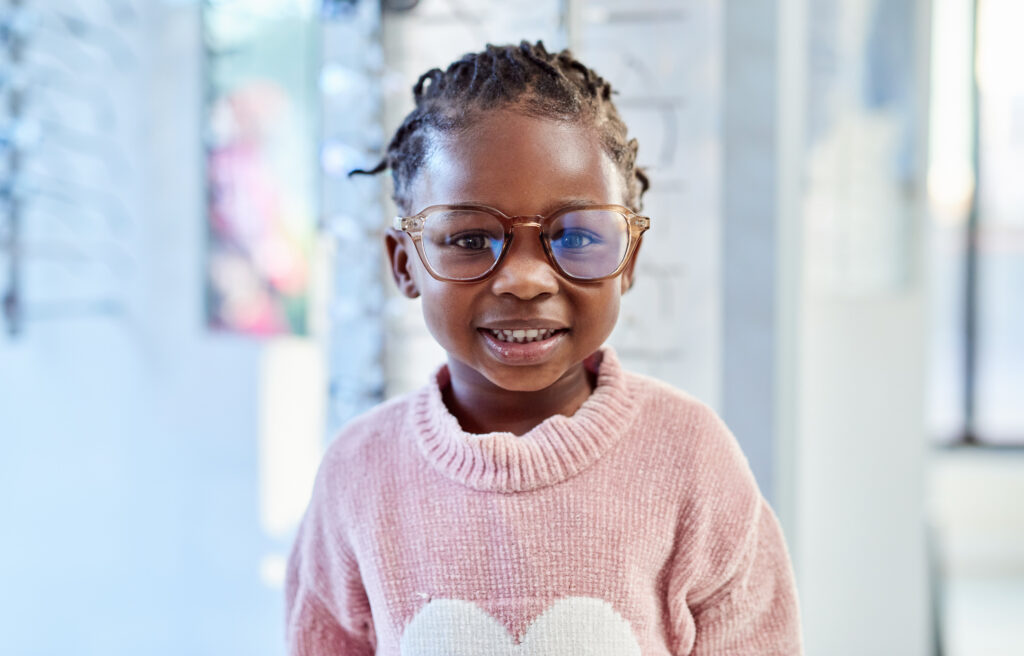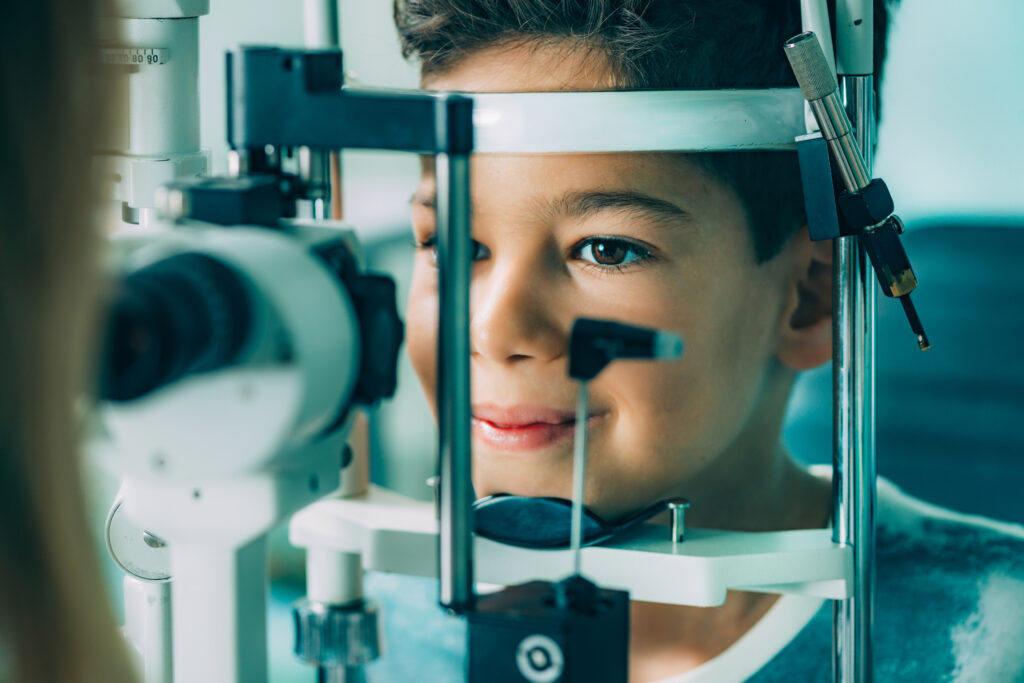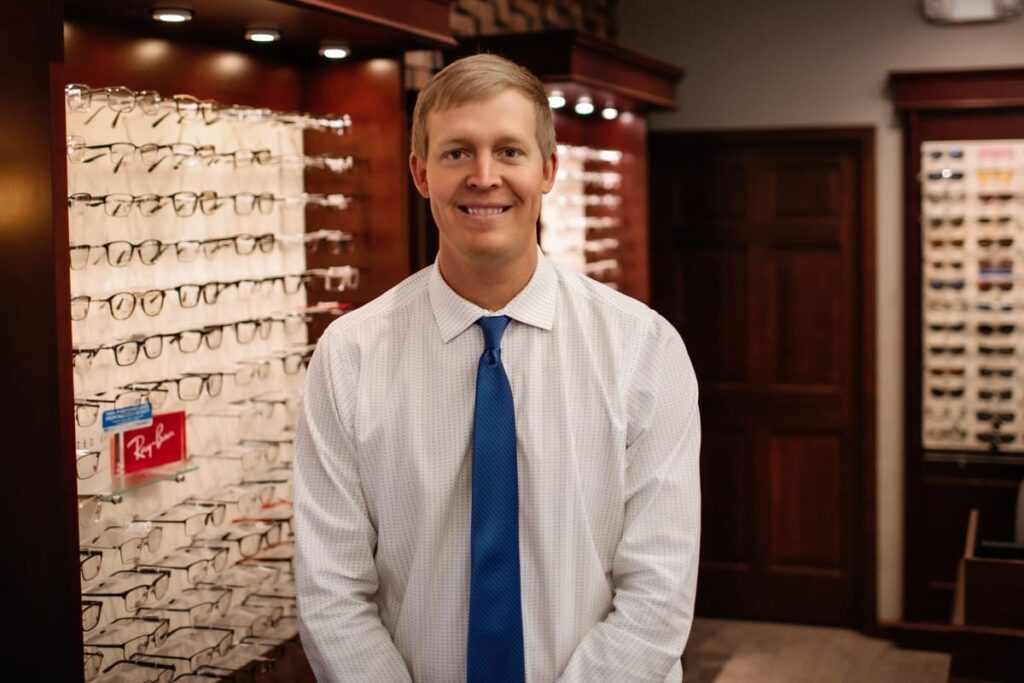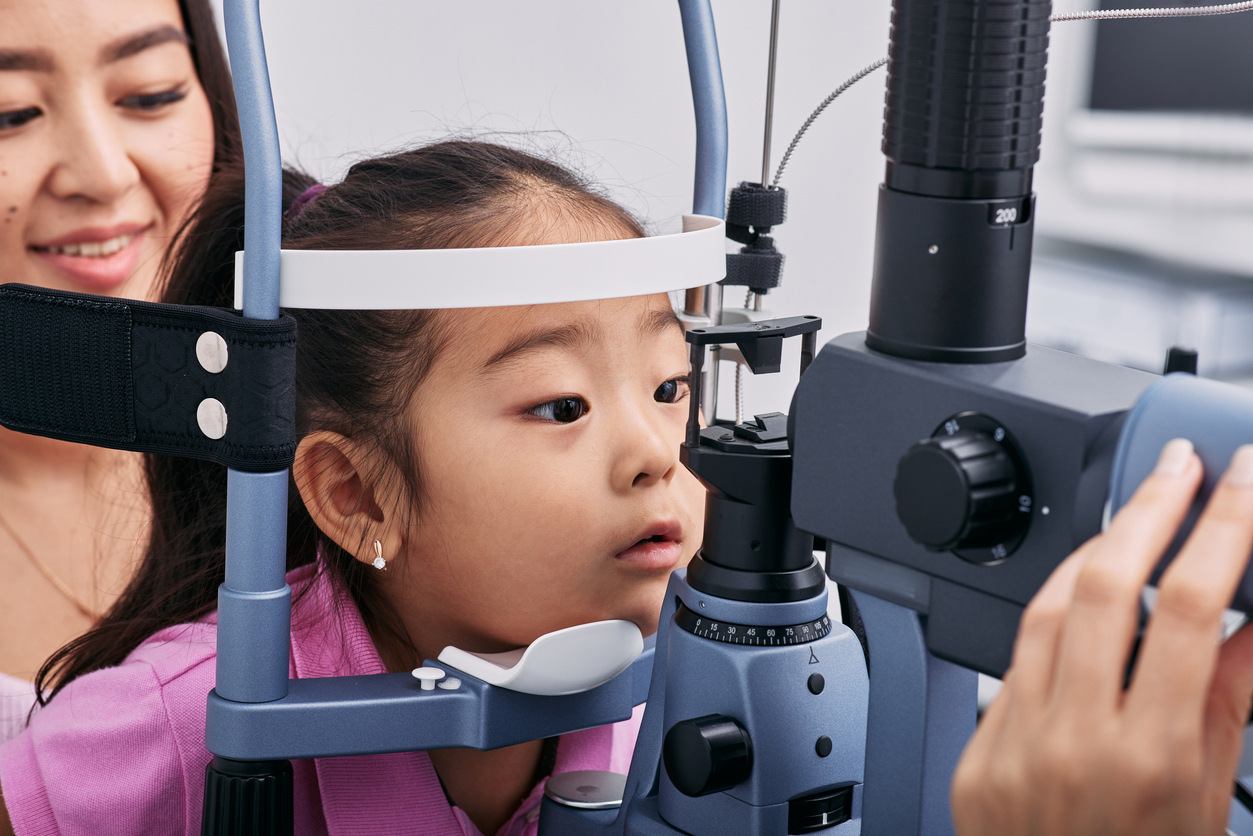You use your eyes on a daily basis for every aspect of your life. They…
The Importance of Regular Kids Eye Exams

As parents, we all want our children to be able to learn, grow, and develop to their full potential. One obstacle 1 in 4 children encounters is a vision problem that can result in difficulty learning and behavioral issues.
The best way to avoid vision problems becoming a struggle for your child is with regular kids’ eye exams. As with adults, regular eye exams for children are essential for protecting your child’s vision and ensuring they’re able to be their best, not just see their best!
Why Regular Eye Exams are Crucial for Children’s Vision Health
Children grow at an incredible rate, and this includes their eyes! Your child’s vision can change often, and sometimes unexpectedly, between the ages of 6 to 18 years old. Regular eye exams are the best way to identify and treat vision problems as early as possible.
Good vision is vital to your child’s ability to see information and assignments on the blackboard at school. Being able to fully participate and perform well in school reduces frustrations and leads to better academic performance.
Uncorrected vision problems can cause impaired childhood development, difficulties learning and completing assignments, behavioral and attention issues, and if left untreated for too long, can lead to permanent vision loss.
Signs and symptoms of vision problems in children:
- Covering one eye
- Holding reading materials or screens close up to their eyes
- Standing or sitting close to larger screens (like TVs)
- Sitting in the front row in class so they can see the front of the room
- Short attention span
- Complains of headaches, eye aches, or other discomforts
- Failing a vision screening
What’s the difference between vision screenings and professional eye exams? Your child’s pediatrician probably screens your child’s vision as part of their annual wellness visit. This vision screening is a simple evaluation used to determine whether your child needs additional eye care.
A professional eye exam, on the other hand, is a comprehensive eye exam completed by an ophthalmologist or optometrist. This exam goes beyond assessing a need for corrective lenses and allows the eye doctor to determine the cause of your child’s vision problem and provide the proper treatment. They can also detect eye diseases early, along with other potential health conditions that can affect eye health, and this early detection is the best way to help preserve long-term vision.
Recommended Frequency for Children’s Vision Exams
Your child should have their first comprehensive eye exam at six months old. Their next comprehensive eye exam should be at age three and before they enter first grade—typically at age 5 or 6. After that, they should have an eye exam at least every two years if they don’t need vision correction. Children who need corrective lenses should have a comprehensive eye exam yearly or as your child’s eye doctor recommends.
Outside of the recommended schedule, consider getting your child’s eyes examined if you see any of the warning signs that your child might be having vision problems; your child is at increased risk of vision problems due to medical conditions or a family history of vision problems; you have any other concerns about your child’s vision.

What to Expect During Your Child’s Eye Exam
What to bring
If your child has glasses, bring them to the appointment, along with a list of any medications your child is taking, the names of any other doctors your child sees, and a list of your child’s known medical conditions.
How to prepare
- Your child’s eye exam could take an hour or more.
- Schedule a younger child’s eye exam near naptime or after mealtime to avoid frustrations and meltdowns.
- Most children won’t have any issues getting an eye exam. If your child is uncomfortable doing new things, explain to them what will happen in a positive and enthusiastic tone.
- Plan extra time at the end of your appointment in case your child needs glasses. Allow enough time to choose a pair of frames and make it a fun experience, so your child will be more willing to wear their glasses regularly.
What to expect
The first time you meet with your child’s eye doctor, be prepared to answer medical questions about your child’s birth history (including complications during pregnancy or delivery), birth weight, and whether they were born full term. The doctor will also ask whether there is a family history of eye problems and your child’s medical history. Be sure to tell the doctor about any delay in motor development and if you’ve noticed any potential eye issues in your child, including if they’ve failed a vision screening.
The specifics of how these exams are done depend on your child’s age. Generally, an exam will include:
- Taking a case history.
- Vision testing.
- Determining whether your child needs corrective lenses.
- Testing their eye alignment.
- Evaluating their eye health.
- Prescribing corrective lenses (if needed).
Doctor’s Recommendation
One of the most beneficial things you can do for your children’s long-term eye health is to ensure they get regular eye exams. Regular eye exams are essential for everyone, even if they don’t wear corrective lenses, especially if any of the warning signs in this article are feeling too familiar.
If you live in Andover, Winfield, or East Wichita, KS, and you’re due (or overdue) for an eye exam, we invite you to schedule an appointment with us!
At Andover & Winfield Family Optometry, we have years of experience providing comprehensive eye care to children of all ages–some of us are parents ourselves! From young children to teenagers, our approach is tailored to meet the unique needs of every age group, combining advanced technology with a warm, family-friendly atmosphere to ensure young eyes receive the attentive and thorough care they deserve.
Our services go beyond a basic visual screening. We perform a series of visual acuity tests to ensure your kids are seeing their best, and we also examine their eyes to identify early signs of health issues to facilitate early treatment and ensure their eye health stays at its best.
Contact us today by calling (316) 361-1020 for our Andover location or (620) 221-2015 for our Winfield location. We can’t wait to meet you!
About the Doctor
Dr. Matt Boswell was born and raised in Wichita, Kansas, where he graduated from Kapaun Mt. Carmel High School. He attended Emporia State University to play on the Men’s Basketball Team while getting his Bachelor of Science degree in Biology, Pre-Optometry. While there, Dr. Boswell made the academic honor roll every year while receiving all-league honors his senior year. After graduating from ESU, he went to Memphis, Tennessee, and received his Optometry Degree from the Southern College of Optometry in 2016. Dr. Boswell is excited to practice back in Andover and Winfield, where he was a patient of Dr. Holman’s growing up and shadowed him in high school.
Dr. Boswell’s areas of interest are comprehensive primary eye care and ocular disease, including glaucoma, macular degeneration, cataracts, and diabetes. He also loves fitting contact lenses and seeing kids. He is an active member of the American Optometric Association and the Kansas Optometric Association. Dr. Boswell resides in East Wichita with his wife, Kirsten, a nurse. They welcomed their first child in February 2022, Baker. They love the outdoors, playing sports, fishing, and staying active with their Bernese Mountain Dog, Franny.




